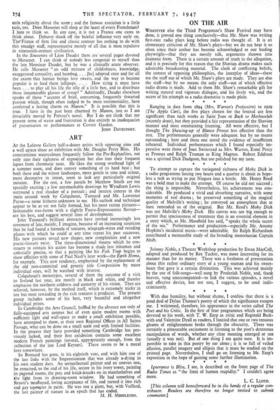ON THE AIR
WHATEVER else the Third Programme's Shaw Festival may have done, it proved one thing conclusively—that Mr. Shaw was writing first-rate radio plays long before radio was thought of. It is an elementary criticism of Mr. Shaw's plays—but we do not hear it so often since their author has become acknowledged as our leading playwright—that they are mostly talk, arguments thrown into dramatic form. There is a certain amount of truth in the allegation and it is precisely for this reason that the Shavian drama makes such admirable broadcasting material. The clash of conflicting beliefs, the contest of opposing philosophies, the interplay of ideas—these are the stuff out of which Mr. Shaw's plays are made. They are also the stuff—but by no means the only stuff—out of which effective radio drama is made. Add to them Mr. Shaw's remarkable gift for writing natural and vigorous dialogue, and his lively wit, and the
secret of his triumph as a radio dramatist is made plain. * * * *
Ranging in date from 1894 (Mrs. Warren's Profession) to 1929 (The Apple Can), the five plays chosen for the festival are less significant than such works as Saint Joan or Back to Methuselah (recently done), but they provided a fair representation of the Shavian manner and most entertaining listening. All were effective, but I thought The Shewing-up of Blanco Posnet less effective than the rest. The performances generally were adequate, but by no means outstanding ; here and there one noted the evidence of insufficient rehearsal. Individual performances which I found especially im- pressive were those of Joan Swinstead as Mrs. Warren, Esme Percy as Proteus and Ralph Truman as King Magnus. Robert Eddison
was a spirited Dick Dudgeon, but too polished for my taste. * * * * To attempt to capture the variegated richness of Moby Dick in a radio programme lasting two hours and a quarter is about as hope- less a task as trying to put Niagara into a bottle. Mr. Henry Reed was a bold man to make the attempt. Of course he did not succeed ; the thing is impossible. Nevertheless, his achievement was con- siderable. He produced a vivid and absorbing narrative, With some moments of real drama ; he preserved something of the magical quality of Melville's writing ; he conveyed an atmosphere that at least reminded us of the original. But Mr. Reed's Moby Dick was not Melville's Moby Dick. His canvas was not big enough to permit that spaciousness of treatment that is an essential element in a story which, as Mr. Masefield has said, "speaks the whole secret of the sea." Performance and production—especially Mr. Antony Hopkins's incidental music—were admirable. Sir Ralph Richardson contributed a memorable study of the brooding monomaniac Captain Ahab.
* * * * Johnny Noble, a Theatre Workshop production by Ewan MacColl, adapted and produced by Rex Tucker, was , more interesting for its manner than for its matter. There was a freshness of presentation about this rather ordinary story of a young seaman and his sweet- heart that gave it a certain distinction. This was achieved Mainly by the use of folk-songs—well sung by Frederick Noble, and, thank heaven, sung unaccompanied—to link the various episodes, a novel and effective device, but not one, I suggest, to be used indis- criminately. * * * *
With due humility, but without shame, I confess that there is a good deal of Dylan Thomas's poetry of which the significance escapes me. I welcomed, therefore, his appearance in the series called The Poet and his Critic. In the first of four programmes which are being devoted to his work, with T. W. Earp as critic and Reginald Beck- with and Valentine Dyall as readers, I fancied that one or two tenuous gleams of enlightenment broke through the obscurity. There was certainly a pleasurable excitement in listening to the poet's dexterous manipulation of words, whether any clear meaning emerged or not (usually it was not). But of one thing I am quite sure. It is ink- possible to take in this poetry by ear alone ; it is so full of veiled allusion, parallel imagery and ellipsis that it must be studied on 'the printed page. Nevertheless, I shall go on listening to Mr. Earp's
exposition in the hope of gaining some further illumination. * * * *
Ignorance is Bliss, I see, is described on the front page of The Radio Times as "the limit of human stupidity." I couldn't agree more.
• L. C. LLOYD. [This column will hencefomeld be in the hands of a regular con- tributor. Readers are therefore no longer invited to submit comments.]


































 Previous page
Previous page